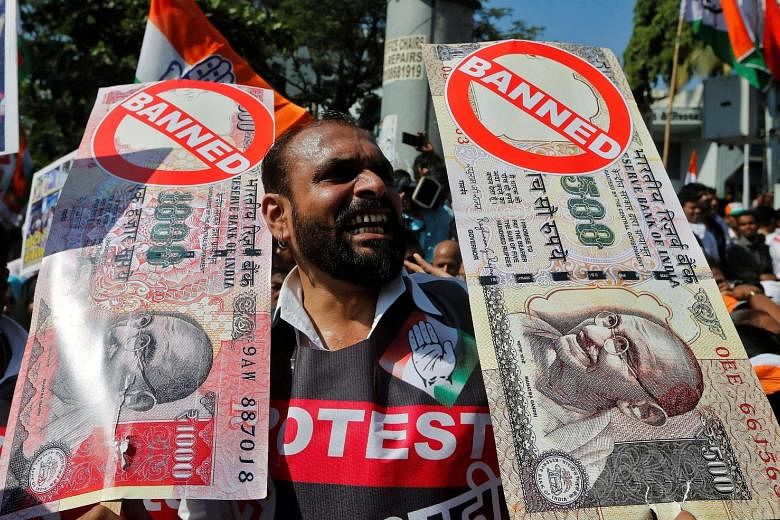Hundreds of thousands of people took part in opposition-led protests across India yesterday, denouncing the government's decision to ban high-value notes earlier this month.
The ban has led to a chronic shortage of money in a nation where most transactions are in cash, particularly the 500-rupee (S$10.40) and 1,000-rupee notes that were suddenly withdrawn in a crackdown against corruption, black money and terror financing.
In the eastern state of West Bengal, Chief Minister Mamata Banerjee led a march of hundreds of thousands of people, including her supporters and party colleagues.
Congress vice-president Rahul Gandhi led protests within Parliament as 14 opposition parties united against the government over demonetisation.
Proceedings in Parliament were also disrupted by the opposition, demanding a rollback of the scheme and improved arrangements for disbursal of new notes.
There were also reports of protesters blocking a few trains in the state of Bihar as opposition parties tried to tap into public anger.
Mr Modi announced the ban on Nov 8, saying it was aimed at bringing billions of dollars in unaccounted wealth into the mainstream economy, and hitting the finances of militants who target India and are suspected of using fake 500- rupee notes to fund operations.
The withdrawal of 86 per cent of the country's currency has hit many people hard.
Old 500- and 1,000-rupee notes must be exchanged at banks for new 500- and 2,000-rupee notes, but the government has struggled to produce enough, leading to widespread shortages of cash and long queues at banks and ATMs.
Some Indians have been unable to access their accounts and all face restrictions on the amount of cash they can withdraw.
"Till now, there is no improvement in the situation. Even now, outside ATMs and banks, people are standing in queues. There is a kind of uncertain atmosphere in the country. This decision was taken without any preparations," said Bahujan Samaj Party chief Mayawati, a regional leader from the state of Uttar Pradesh, which goes to the polls early next year.
Mr Modi's ruling Bharatiya Janata Party (BJP) has launched a major campaign in the state to woo voters ahead of the polls.
Former prime minister Manmohan Singh has said the cash crisis could cause a 2 per cent drop in economic growth.
While the impact of demonetisation is still being debated, political analysts said opposition parties had also not yet gained much political capital from the crisis, given the high degree of fatigue with endemic corruption and black money in India.
A call for a shutdown in West Bengal by Left parties did not have much impact yesterday.
"At one level, the popular sentiment against corruption and black money is very strong. Public perception is that if it helps, a little inconvenience is okay," said Bangalore- based political analyst Sandeep Shastri.
"If the problems ease out, they (BJP) get rich dividends. But if it becomes long term, then it could negatively impact Mr Modi. A lot depends on whether the problem eases by the new year. For now, the government has the edge."
Even as opposition parties labelled yesterday "aakrosh diwas" or "anger day", people continued to patiently queue outside banks to get cash.
"I have been coming for the last three days and haven't got money. The money in the bank runs out within a few hours," Mr Sunil Maurya, 29, a businessman standing outside a bank in South Delhi, told The Straits Times.
"I don't know if this is going to be worth all the trouble."

